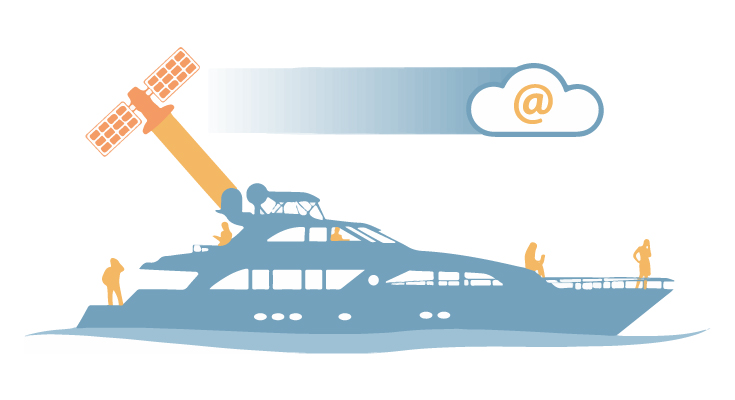Today, technology has evolved so much that you can get internet connectivity even in the most remote corners of the world. Over the last decade, we’ve become incredibly reliant on internet connectivity. And, there’s just no way to unplug and get away from the internet. It’s nice to know that you can stay connected to your loved ones throughout the remote corners of the world. While the mobile internet has its limitation, it’s possible to get satellite internet almost anywhere you are. Let’s say you’re planning to take a long relaxing boat trip with your family, how can you stay connected to the world on the land? Satellite internet for boats can help you and your family stay connected to the internet.
So, have you heard about satellite internet for boats for the first time? Well, if you’re looking to get satellite internet for boats, then you need to consider a lot of factors. Your primary concern should be providers, costs, type of equipment, and internet plans. Let’s start with our guide on satellite internet for boats and all you need to know about it.
Satellite Internet Options for Boats
If you know anything about satellite internet, then you may already know about the type of equipment required and the average cost of satellite internet. It’s obvious that you won’t get the general satellite internet providers or plans that you’re familiar with when you’re on a boat. And there’s a chance that you’ll have to use a technology that you’re completely unfamiliar with.
Some of the top names for satellite internet for boats are:
- Iridium
- Inmarsat
- KVH
These providers are different than HughesNet or Viasat as they specialize in providing satellite internet access on boats. They also manufacture satellite dishes or satellite internet devices for maritime connectivity. These maritime satellite internet providers also develop the software needed for internet connectivity. They have a monthly plan, and users will have to purchase the equipment instead of renting them. You need to know all the obligations before you sign a deal with these internet providers.
As for the hardware, it actually differs from what you’d get if you’d sign up with an ordinary satellite internet provider (HughesNet & Viasat). Most maritime satellites are in the shape of a dome which is a good idea for a boat where you want your dish to be fixed in a single place. On a dish, you can’t point the dish to a particular location, so these dome-based satellite devices make up for the fact and this different equipment costs a huge amount.
There are also other devices for satellite internet for boats, that look a bit different. Some maritime satellite internet providers use a BGAN terminal (Broadband global area network). A BGAN terminal is huge and you can access the internet and make calls by plugging in the standard phone. Also, there are ISAT devices that can be used to connect satellite internet on a boat.
Cost of Satellite Internet for Boats
Gaining access to the internet on a boat can be expensive. And it makes sense that you’re paying for luxury. The process isn’t like signing up to any ordinary residential internet provider. The equipment costs and obtaining the service are extremely expensive. You also have to figure out the service costs, which are more expensive than any other provider you’ll find on land.
Equipment costs of satellite internet for boats can go up to thousands of dollars, and if not ten of thousands of dollars. The low end of equipment cost will be as low as $1,400, and if you want something more fancy and high-end for huge boats, the cost can go up to $50,00 (just for hardware). And, there’s a cost of satellite internet service installation on your boat, as it’s a difficult and technical process.
Now comes the service cost for the internet service itself. If you’ve been living in a city and are habitual of using unlimited internet service for just some hundred dollars, then you won’t like maritime satellite internet plans. While there are low-cost plans for satellite internet on boats, they are extremely rare. If you want unlimited internet access on your boat same as your home, then the plan range could be $1,000 – $9,000.
Maritime satellite internet plans are more expensive compared to other providers because the data transmission costs are huge. Plans with higher data caps can easily reach $1,000 and even those plans will only offer a couple of gigabytes. To get truly unfettered access, you’re more than likely to pay almost $9,000. If you’re planning to spend a long time on the water, you’ll easily go through some gigabytes of data.
Speed of Satellite Internet for Boats
One of the biggest challenges with satellite internet of all kinds is its slow speed. If you’ve ever used a DSL internet connection, the speeds you get with Maritime satellite internet are also similar. On low-end plans, you’ll get 128 KBPS, and on high-end plans, it offers 2 MBPS plans. While the speeds aren’t exactly slow, they’re also not incredibly fast either.
If you want to stream Netflix or HD videos, you’ll face some challenges. Even for the lowest quality streams, Netflix recommends a minimum of 500 KBPS, which you won’t be able to get with low-end maritime satellite internet plans. For an SD stream, you need at least 3 MBPS speed. Even on the top satellite internet plans for the boat, you won’t get 3 MBPS speed.
There’s not much data available on latency and other types of speeds that you’ll get from satellite internet. But one thing is for sure, you won’t be able to do any online gaming or any activities that require low ping and low latency level.
Final Take: Maritime Satellite Internet Providers
Maritime satellite internet service and residential satellite internet plans can’t compare to cable and fiber internet service. If you’re looking into satellite internet for boats, then you should know all about it. The main things you need to keep in mind are that speeds can’t match up, the equipment costs are extremely expensive and you’ll pay huge amounts for internet service itself.




